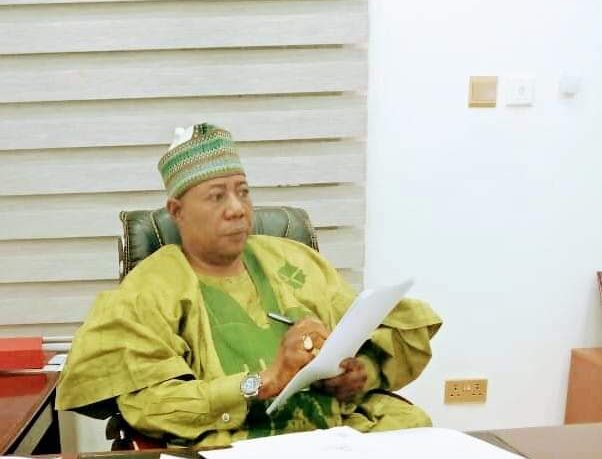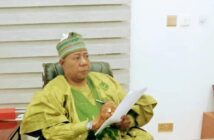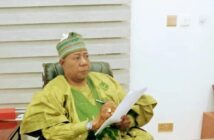Last week, a group of eminent Nigerians known as The Patriots led by former Secretary General of the Commonwealth, Chief Emeka Anyaoku, were in Aso Rock where they asked President Bola Ahmed Tinubu to immediately institute a process of producing a new constitution for the country.
Specifically, the group said the new constitution had become imperative as the existing one has no capacity to take the country to the promise land. In the bid to persuade Tinubu to yield to their demand, they told the president that the constitution is responsible for the prevailing situation in the country.
But not a few Nigerians think like I do that the call for President Tinubu to convene a constituent assembly by the Patriots to draft a new constitution for Nigeria is a well-meaning but misguided effort. It is commendable that the group, led by Chief Emeka Anyaoku, is invested in Nigeria’s affairs, but the country doesn’t need a new constitution right now.
We have had numerous constitutional conferences in the past, including those organized by Gen Sani Abacha in 1994 and President Goodluck Jonathan in 2014. These conferences aimed to address governance challenges and provide a framework for a more stable and prosperous nation.
However, their recommendations have been left to gather dust without implementation, a clear indication that the problem lies not with the constitution itself but with the political will to implement reforms.
As Senator Shehu Sani, a member of the Patriots, noted, the National Assembly passed a law to change the National Anthem, emphasizing the need for wider public consultation and factoring it into constitutional amendments. Otherwise, it could be misinterpreted as an attempt to dissolve the country by altering one of its most important pillars. This highlights the importance of careful consideration and consensus-building in any constitutional reform process.
Instead of calling for a fresh conference, the Patriots should build on previous efforts and work with the National Assembly to push for legislation that addresses pressing issues like devolution of power, revenue allocation, and electoral reform.
The constant call for a new constitution without consolidating on previous efforts raises concerns about the group’s true intentions. Nigeria has experimented with different systems of government since independence in 1960, switching from parliamentary to presidential and back again. This lack of consistency and stability has hindered progress and development, making it essential to focus on implementing reforms rather than creating new opportunities for corruption and waste.
Furthermore, the Patriots’ approach suggests ulterior motives. Previous conferences have been used to siphon billions of taxpayers’ money into private accounts, and it’s essential to avoid repeating this mistake. The focus should be on implementing reforms and improving governance, rather than creating new avenues for corruption and waste.
President Tinubu has expressed respect for the Patriots and their contributions to national discourse, but it’s crucial to support him in implementing landmark reforms rather than diverting attention to a new constitutional conference.
The President has assured that the constitution will be reviewed, and it’s essential to allow him to focus on this task without unnecessary distractions. It appears they have forgotten that a country’s constitution is its most fundamental legal document, outlining the framework of governance, rights, and principles that shape the nation’s identity and direction. Hence, it cannot be changed as if it were a mere wrapper or clothes. While adapting to changing times is essential, frequent constitutional changes can have far-reaching consequences, impacting stability, security, and prosperity.
Frequent constitutional changes can lead to instability and uncertainty for citizens and investors, create potential for political manipulation and abuse of power, undermine constitutional supremacy and the rule of law, and disrupt institutional continuity and national identity. For instance, the frequent changes to Nigeria’s constitution have created confusion and uncertainty, making it challenging for citizens and investors to understand their rights and obligations.
Rather than frequent overhauls, a more effective approach is to amend the constitution to reflect changing dynamics while maintaining its core principles. This method preserves institutional continuity and national identity, allows for adaptability without sacrificing stability, and encourages careful consideration and consensus-building. For example, the United States’ constitution, written in 1787, has been amended 27 times, yet its core document remains intact, demonstrating the enduring nature of its foundational principles.
Instead of calling for constitutional changes, we can draw inspiration from countries with workable systems that have never changed their constitutions but have made amendments to address contemporary realities. The United Kingdom’s uncodified constitution has evolved over time without a single, comprehensive document, while Saudi Arabia’s constitution, based on Islamic law, has undergone minimal changes since its adoption in 1992. These examples demonstrate that constitutional reform can be achieved through careful amendment and adaptation rather than frequent overhauls.
They started with the issue of creation of state police and failed. Now, they have come again with the idea of a new constitution, all in a bid to distract the president’s renewed hope agenda for economic growth, and before we know it, 2027 politicking is already at the corner. Enough of these distractions.
When some of us read news of the Patriots’ visit to the president we thought they were in Aso Rock to present copies of documents on how to recover billions of dollars siphoned by previous governments as well as their contributions to the ongoing industrial revolution and the full implementation of the Petroleum Industrial Act (PIA).
We had thought they had gone to the villa with perfect plans for the National Security Adviser to conduct a forensic audit of the Nigerian security system, and how security operatives working in the oil region of the Niger Delta can cub oil theft wich is impacting negatively on the country’s economy. We had also expected the ‘patriotic citizens’ to come up with suggestions on how IMF and World Banks loans could benefit the country.
In the alternative, the Patriots would have proposed a constituent assembly to draft a new constitution using their own funds and wealth of political experience, and informing the president that they will present it to him on completion as their contribution to nation building. Anything short of that would amount to another political jamboree where taxpayers’ money will be squandered, while their recommendations gather dust on the shelves just like others.
In the build up to the protest, we saw how some of these self-acclaimed patriotic citizens issued press statements and were everywhere in the media, asking Nigerians to shelve the protest. Did Nigerians listen to them. Certainly not! But when President Tinubu addressed the citizens in a nationwide protest, there was a great calm. Nigerians listened to him because the have sublime faith in his renewed hope administration.
In conclusion, while the Patriots’ call for a constitutional conference is well-intentioned, it’s not the solution Nigeria needs now. Instead, the focus should be on implementing reforms, consolidating on previous efforts, and improving governance. By doing so, we can create a more stable, secure, and prosperous nation for all citizens.
The claim by the Patriots that constitutional defects is the cause of the current situation which led to the so-called #EndBadGovernance protest is a red herring. Nothing could be further from the truth. Just as the the Council of State rightly mentioned when it passed a vote of confidence in President Tinubu on Tuesday, the failed protest was a fruitless attempt at regime change by opposition leaders who are still dazed by post-election trauma.
A real protest by Nigerians will definitely be targeted at state governors whom the people are gradually identifying as the cause of their misfortune, not President Tinubu. A protest truly championed by Nigerians will focus on demanding accountability from the governors who have been receiving palliatives, both in cash and kind, to address the hardship confronting the people but cannot account for them, including federal allocations that have skyrocketed due to fuel subsidy removal. What President Tinubu should do is to invite all state commissioners of Finance and grill them thoroughly on how these monies are being expended.
There are reports of a northern governor whose Chief of Staff was said to have diverted the rice palliatives, and is using them for commercial purposes. These are the issues the Patriots are expected to address, and not constituent assembly as they are demanding.
What else can I say about all the policies and interventions of the Tinubu administration to better the lot of the citizens. They are all there in the public domain. I have written severally about them, to the extent that most have my readers have tagged me as defacto spokesman of the president.
Let me also seize this opportunity to thank the ever vibrant and cerebral Special Adviser to the President on Media and Publicity, Chief Ajuri Ngelale, who has remained relentless in enlightening Nigerians about the policies of the Renewed Hope administration. It has not been easy but he has continued to let Nigerians know what their president is doing to improve their living conditions. He should not relent because history will definitely vindicate the just. Certainly, his history will be fair to President Tinubu.




